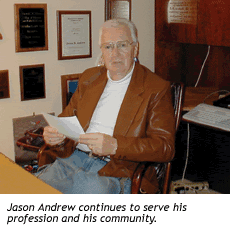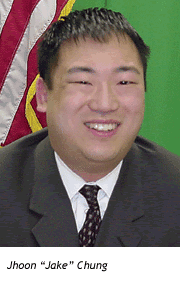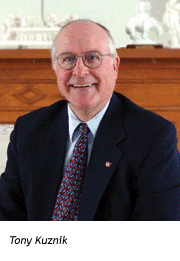|

Serving
Industry, Serving the Academy
 As
an innovative leader in state education, dedicated university
teacher, and budding publishing entrepreneur, Jason
Andrew (MA ’66/PhD ’70) has spanned the
public and private sectors during his career as a rehabilitation
professional. After careers as a top administrator at a state
education agency and a faculty member of a state university,
Andrew recently launched his own publishing business, Aspen
Professional Services. And with each career shift, he has
brought the knowledge and experience gained in one position
and leveraged it to benefit the citizens, students, and clients
at the next. As
an innovative leader in state education, dedicated university
teacher, and budding publishing entrepreneur, Jason
Andrew (MA ’66/PhD ’70) has spanned the
public and private sectors during his career as a rehabilitation
professional. After careers as a top administrator at a state
education agency and a faculty member of a state university,
Andrew recently launched his own publishing business, Aspen
Professional Services. And with each career shift, he has
brought the knowledge and experience gained in one position
and leveraged it to benefit the citizens, students, and clients
at the next.
When Andrew was enrolled at Iowa, the Rehabilitation Counseling
program was housed in East Hall, and Andrew recalls that Professor
Leonard Miller often transformed a “friendly neighborhood
bar” into a memorable teaching forum.
“He would talk rehab as long as he had an audience,”
Andrew says, “which typically was well into the night.
His style was to make you think.”
Andrew says Miller would demand evidence to buttress opinions
and logical thinking to support beliefs. It’s an approach
Andrew himself has employed as an administrator and teacher.
After earning a Ph.D., Andrew remained in Iowa City for two
years to serve as the executive director of Goodwill Industries
in Southeast Iowa. He then became the director of a federally
funded vocational rehabilitation institute at the University
of Wisconsin at Menomonie. The administrative experience he
gained served him well in his next position as the associate
commissioner of education and director of the Division of
Rehabilitation Services for the Nebraska Department of Education,
a position he held until 1993.
Andrew enjoyed the autonomy of his role at the state education
agency, which operated under the direction of an elected board
rather than a political appointee.
“It was very much like having one’s own $19 million
business,” he says. “With good people and good
oversight, we raised the level of professionalism and set
new directions.”
Under his leadership, the Nebraska rehabilitation program
went from a third-rate agency to one that was recognized for
the quality of its services and its innovative programs.
After 17 years, however, the agency operated so well that
Andrew felt he lacked the challenge of the early years, so
he decided to try his hand at higher education. From 1993
to 2002, he served various roles at the University of Arkansas
Department of Rehabilitation Education and Research, including
research professor, department head, and graduate program
coordinator.
“Jason brought extraordinary public sector experience
to the academy, where it provided an incomparable benefit
to his students and colleagues,” says Clayton Faubion,
associate professor of rehabilitation services at the University
of Maryland, Eastern Shore. Andrew served as Faubion’s
dissertation advisor at Arkansas and together, the two scholars
have published a dozen articles and edited one textbook. “But
despite his vast knowledge and unique experience, Jason is
unusual—he is an academic who does not toot his own
horn.”
Although Andrew says he enjoyed classroom teaching, after
his former career directing a state agency where he made and
implemented decisions quickly, he found the university system
frustrating.
“It takes three years to do anything in a university,”
he says.
Nevertheless, Andrew managed to salvage Arkansas’ ailing
doctoral program in rehabilitation and transform it into one
ranked seventh best in the nation. And although he retired
from academic life in 2002, he says he would enjoy volunteer
teaching to continue being in contact with students.
Since retiring, Andrew has hardly rested on his laurels. In
2002 he was awarded the Switzer Distinguished Fellowship.
A panel of peer reviewers bestows the federally funded stipend
for yearlong research. Andrew’s project focused on the
use of distance education to deliver rehabilitation counselor
training at the master’s degree level across the United
States.
Today, the Iowa native edits two professional journals, edits
and publishes books for his new company, and is working to
develop a curbside recycling program in his Osage Beach, Missouri
hometown. –by Jean Florman

  Jhoon
“Jake” Chung (BA ‘96) recently
accepted the position of principal for Lincoln Prairie School
in Schaumburg (Ill.) School District 54 that will begin July
1. Lincoln is an innovative, pre-K-8, community-based “school
of choice” that draws upon numerous ideas from its constituents.
Any student in the district may apply, but due to limited
enrollment of just over 300, students are chosen by lottery
system. In addition to allowing students to define their own
goals each morning and “Project Development” where
students drive their own instruction based upon personal interests,
all students starting fourth grade receive their own laptop
computer. The school also holds monthly meetings for the students,
staff, and community members. Jhoon
“Jake” Chung (BA ‘96) recently
accepted the position of principal for Lincoln Prairie School
in Schaumburg (Ill.) School District 54 that will begin July
1. Lincoln is an innovative, pre-K-8, community-based “school
of choice” that draws upon numerous ideas from its constituents.
Any student in the district may apply, but due to limited
enrollment of just over 300, students are chosen by lottery
system. In addition to allowing students to define their own
goals each morning and “Project Development” where
students drive their own instruction based upon personal interests,
all students starting fourth grade receive their own laptop
computer. The school also holds monthly meetings for the students,
staff, and community members.
“ It’s a once in a lifetime opportunity to serve
at a school like this,” Chung says. “It will be
a real honor to work with the great staff and the fantastic
community. “
Prior to this position, Chung taught sixth grade for three
years and was an educational administrator for four years
at Palatine (Ill.) School District 15.
Sita
Singh (MA ‘96) is principal of River Valley
Primary in Singapore. Prior to this position, she taught for
eight years in a secondary school and has been part of the
psychological and guidance services team at the Ministry of
Education, also in Singapore.
In a recent online interactive through The Straits Times,
Singh says, “Although primary school pupils do not have
to participate in co-curricular activities, they are strongly
encouraged to do so to build their character and team spirit
and to learn responsibility.
“ These co-curricular activities give children the opportunity
to interact with pupils from different racial and social backgrounds,
age groups and academic abilities.
“I recommend that children participate in at least one
school co-curricular activity because the memories of the
experience and the bonds forged will be with them long after
they leave school.”
© 2003 Singapore Press Holdings

 Dawn Staver (BA
’83) traded in a classroom for a school. After 18 years
teaching grades K-6, Staver accepted the position as principal
of Snowy Range Academy, the first charter school in Wyoming.
Dawn Staver (BA
’83) traded in a classroom for a school. After 18 years
teaching grades K-6, Staver accepted the position as principal
of Snowy Range Academy, the first charter school in Wyoming.
The school’s curriculum is different than most public
schools in that it stresses parental involvement. “I was
very interested in the charter school concept and thought that
any organization that has parents actively involved…would
be wonderful to be a part of,” she said.
The school recently added grade six, which boosts enrollment
by 30 percent. It currently has 129 students and could have
up to 156. LaramieBoomerang.com © 2003
Diana
Henry (MA ’84) received the 2001 Teacher of
the Year award from the Iowa Council for the Social Studies.

 Lexa
Rossow Braxmeier (BA ’70/MA ’76) taught
remedial reading for a year in Illinois and five years in
Iowa before moving to South Carolina where she is in her 12th
year teaching third grade at Myrtle Beach Elementary School.
She writes that with all of the emphasis on higher test scores,
she’s concerned with long-term results…and that
she is extremely proud to be a University of Iowa graduate. Lexa
Rossow Braxmeier (BA ’70/MA ’76) taught
remedial reading for a year in Illinois and five years in
Iowa before moving to South Carolina where she is in her 12th
year teaching third grade at Myrtle Beach Elementary School.
She writes that with all of the emphasis on higher test scores,
she’s concerned with long-term results…and that
she is extremely proud to be a University of Iowa graduate.
 Tony
Kuznik (PhD ’71) retired as president of Minnesota’s
Hibbing Community and Technical College. Through his lengthy
career, Kuznik became one of Northeastern Minnesota’s
most respected higher education leaders. Tony
Kuznik (PhD ’71) retired as president of Minnesota’s
Hibbing Community and Technical College. Through his lengthy
career, Kuznik became one of Northeastern Minnesota’s
most respected higher education leaders.
“ He was a president with a long list of accomplishments
of which the latest and greatest was bringing together the
liberal arts and technical components under one roof,”
said Joe Sertich, president of the Northeast Higher Education
District. “He’s a decent man who cared about the
institution, was a champion of higher education and is a scholar
in his own right.”
Kuznik also worked 14 years at the University of Minnesota–Crookston
as a professor and vice chancellor, was associate director
of test administration and special services for the American
College Testing program in Iowa City, Iowa, and taught music
eight years in Ada Public Schools.
Kuznik’s accomplishments at Hibbing are many. Those
closest to him say his calm but controlled leadership has
been a primary reason not only for the school’s success,
but for the respect he has earned.
“ Years from now, if you say ‘Tony Kuznik and
Hibbing Community College,’ the words are going to be
synonymous,” said Ken Simberg, provost. “He didn’t
wait for things to happen—he was always pushing to get
things done and that’s what served the college well.”
By Lee Bloomquist © 2004 Duluth News Tribune
William
Page Johnson (MA ’72/PhD ’74) was appointed
superintendent for St. Mary’s School for the Deaf in
Buffalo, N.Y., the 10th administrator in the school’s
150-year history. Johnson, who is deaf and is the son of two
deaf parents, came from the Iowa School for the Deaf in Council
Bluffs, Iowa, where he served as superintendent since 1987.
Before that, he was superintendent of the Illinois School
for the Deaf in Jacksonville, Ill., a position he held for
11 years.
During his 16-year tenure in Iowa, Johnson helped implement
numerous improvements in the educational and student-life
programs, enhanced vocational and job-training services and
opportunities, and oversaw many technological advances. Under
his leadership the school also updated its curriculum to meet
state standards, introduced innovative teacher-training initiatives
and constructed a multi-purpose complex on campus that boasts
athletic facilities, a swimming pool, classrooms, and meeting
space.
While at the Illinois School for the Deaf, both the school
and Johnson received national and state recognition for the
innovative programs he instituted such as combining computer
instruction with captioned films to improve the reading skills
of hearing impaired students. Now common practice for teaching
the hearing impaired, the Illinois School was the first deaf
school in the nation to use this approach. © 2004
American City Business Journals
Jim
Blanche (MA ’74/PhD ’92) will take over
as superintendent of Lombard (Ill.) Elementary School District
44 in July. Prior to this appointment, Blanche served as superintendent
for the Davenport Community School District, which covers
a diverse population of 17,000 students.
He recently joined The University of Iowa College of Engineering
Advisory Board. Blanche has worked with the College of Engineering
and Opportunity at Iowa on a national program for underrepresented
secondary school students, as well as several partnerships
in the area. He was invited to join the board for his expertise
and experience in motivating young people to consider engineering,
science, and technology for their college studies, and plans
to work on curriculum issues while on the board.
James
“Bernie” Machen (PhD ’74), a 59-year-old
dentist with a casual style who served five years as president
of the University of Utah was named president of the University
of Florida in Gainesville last fall.
Barbara
J. Hennigan (BS ’78) teaches kindergarten in
Greensboro, N.C. She received her master’s degree in
reading from University of North Carolina–Greensboro
in 1990 and passed national boards last fall.
1960s
Joan
Gosenberg Flagg (BA ’63) is in her 24th year
of teaching and currently teaches second grade at Greece
Christina
School in Rochester, N.Y. She writes that she is thankful
for her training at The University of Iowa and truly loves
being able to lead children during their formative years.
 Regina
Hartwig (BA ’64) is a school psychologist at
Black Diamond Middle School in Antioch, Calif. Previously,
she worked as a school psychologist at Indian Trail Jr. High
School in Addison, Ill., but moved to be closer to her family. Regina
Hartwig (BA ’64) is a school psychologist at
Black Diamond Middle School in Antioch, Calif. Previously,
she worked as a school psychologist at Indian Trail Jr. High
School in Addison, Ill., but moved to be closer to her family.
Robert Goldman (PhD ’68) began his career as
an educator and school administrator in Illinois and has worked
since then in Iowa, Massachusetts, and Connecticut. He retired
in 2001 as executive director of Cooperative Educational Services
in Trumbull, Conn., only to return to work in 2002 as interim
superintendent for Wethersfield schools. In September, he
will again use his broad experience in school administration
to serve as interim superintendent in Haddam, Conn.
For Goldman, service as an interim superintendent allows him
to continue an avocation he enjoys, and an “opportunity
to be retired and an opportunity to serve communities.”
The task of interim superintendent requires a slightly different
approach in school administration, Goldman said, carrying
an obligation to ensure that the district runs smoothly, but
without instituting any measures that would dramatically change
its course before the arrival of a permanent superintendent.
The Middletown Press © 2003
 Marilyn
Steele Penn (BA ’65) taught in Virginia, Missouri,
and Wisconsin after graduation. She went on to get a master’s
degree in elementary education and is in her 20th year teaching
fourth grade at Royal Oaks Elementary School in Sun Prairie,
Wisc. She writes, “I am proud of my Iowa degree. It
has always been a foot in the door for me. Of all the things
in my life—the ups and downs, the happy times and sad
times—my education degree from Iowa has always been
there and I plan to use it a while yet before retiring.” Marilyn
Steele Penn (BA ’65) taught in Virginia, Missouri,
and Wisconsin after graduation. She went on to get a master’s
degree in elementary education and is in her 20th year teaching
fourth grade at Royal Oaks Elementary School in Sun Prairie,
Wisc. She writes, “I am proud of my Iowa degree. It
has always been a foot in the door for me. Of all the things
in my life—the ups and downs, the happy times and sad
times—my education degree from Iowa has always been
there and I plan to use it a while yet before retiring.”
Marguerite “Maggie” (Marshall)
Sneed (BA ’69)
was promoted to full professor of education and appointed
chair of the Education Division at Alverno College in
Milwaukee,
Wisc., in May 2003.
 J.
Robert Hanson (MA ’52/MFA ’53/PhD ’58)
has come out of retirement to serve as interim director of
the Concordia College band in Moorehead, Minn. Hanson taught
at the University of Wisconsin-Milwaukee before joining the
music faculty at Concordia College in 1966. He conducted the
Concordia College Band for eight years and was the founder
and conductor of the Concordia College orchestra from 1967
until his retirement in 1995. J.
Robert Hanson (MA ’52/MFA ’53/PhD ’58)
has come out of retirement to serve as interim director of
the Concordia College band in Moorehead, Minn. Hanson taught
at the University of Wisconsin-Milwaukee before joining the
music faculty at Concordia College in 1966. He conducted the
Concordia College Band for eight years and was the founder
and conductor of the Concordia College orchestra from 1967
until his retirement in 1995.
Hanson was also the conductor of the Fargo-Moorhead Symphony
Orchestra from 1974 to 1990. During his tenure the symphony
received four ASCAP awards for “Adventuresome Programming
of Contemporary Music.” An accomplished trumpet player,
Hanson has an extensive background in performance, which included
playing principal trumpet with the Milwaukee Symphony Orchestra.
As a composer, he has written works for orchestra, band, and
other instrumental and vocal ensembles. Recent compositions
include commissioned works for the Minnesota All-state Orchestra,
the Greater Twin Cities Youth Symphonies, the Twin Cities
Suburban Festival Orchestra, the Grand Forks Central and Red
River High School Bands, and six anthems for three churches
in Willmar, Minn., as part of the Church/Synagogue Residency
program sponsored by the American Composers Forum.

|